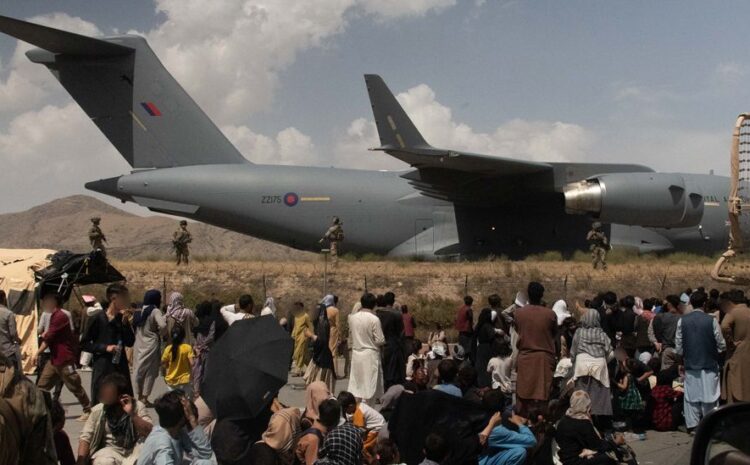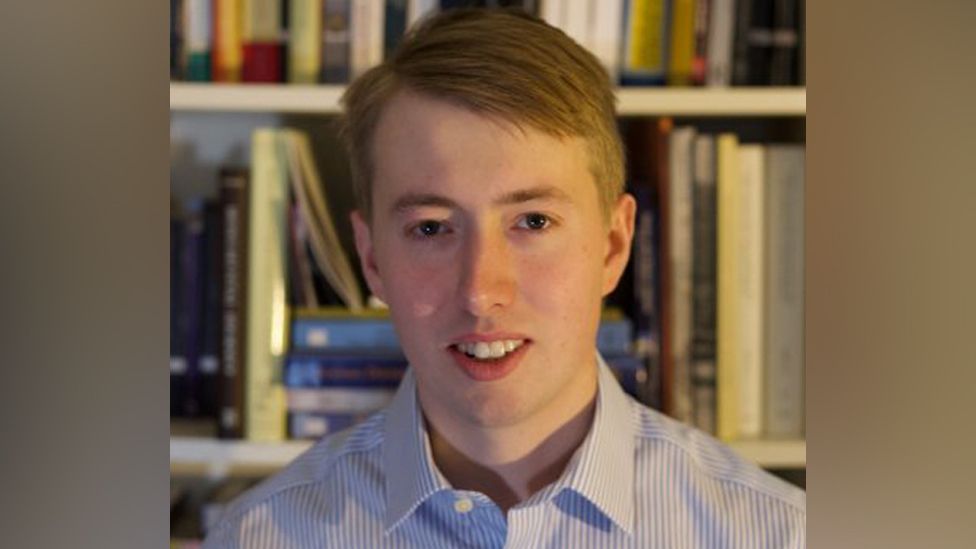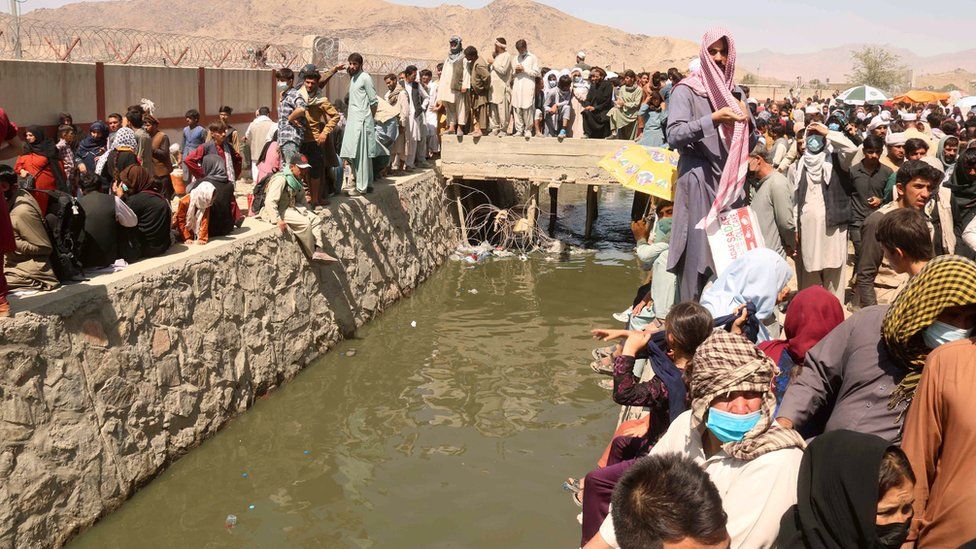
MOD VIA PA MEDIA
By James Landale & Joseph Lee
BBC News
Raphael Marshall said the process of choosing who could get a flight out was arbitrary and thousands of emails with pleas for help went unread.
The then Foreign Secretary Dominic Raab was slow to make decisions, he added.
Mr Raab told the BBC lessons would be learned but the UK did a good job compared to other countries.
After the Taliban took control of Afghanistan’s capital, Kabul, the UK airlifted 15,000 people out of the country, including 5,000 British nationals, 8,000 Afghans and 2,000 children.
In written evidence to the Foreign Affairs Committee, Mr Marshall said up to 150,000 Afghans who were at risk because of their links to Britain applied to be evacuated – but fewer than 5% received any assistance.
Meanwhile, the Foreign Office’s top civil servant was repeatedly questioned by MPs about his decision to continue his holiday for 11 days after Kabul fell to the Taliban.
He insisted cover arrangements were in place and he had “stayed in touch with the department all the way through the period”.
But committee chairman Tom Tugendhat said he found Sir Philip’s decision “strange” given Mr Raab had returned.
Mr Raab said the two-week evacuation was “the biggest operation in living memory” of its kind and the UK had helped a larger number of people than any nation except the US.
Other criticisms were “rather dislocated from the operational pressures and conditions”, he said.
“I don’t doubt there were challenges, I don’t doubt there will be lessons to be learned but if you look at the facts, I think we did a good job by recent standards of evacuations and by international comparisons,” he told BBC Breakfast.
Mr Marshall, who was a senior desk officer at the Foreign, Commonwealth and Development Office (FCDO) until he resigned in September, said there was inadequate staffing at the department’s crisis centre, and staff would not normally be expected to work at weekends or overnight.

There was also a lack of expertise and a lack of co-ordination between the department and the Ministry of Defence, he added.
Mr Marshall also said Mr Raab took hours to answer emails and “did not fully understand the situation”.
Mr Johnson said the allegation that he intervened on this issue was “complete nonsense” and that the rescue operation was “one of the outstanding military achievements of the last 50 years or more”, under “pretty harrowing circumstances”.

What are the allegations?
The key issues flagged by Foreign Office whistleblower Raphael Marshall include:
- Only 5% of the 150,000 people who requested help received any
- Nobody in the team dealing with requests had studied, had any detailed knowledge of Afghanistan, or had ever worked there
- No one spoke any Afghan languages, with calls to people asking for help conducted in English
- Decisions about who to rescue were arbitrary, and thousands of emails pleading for assistance were not even read
- The IT system was dysfunctional, with eight soldiers drafted in to help left sharing one computer
- Dominic Raab was slow to make decisions on difficult cases and did not fully understand the situation
- Animals from the Nowzad charity run by a former Marine were not in danger and evacuating them was at the direct expense of people at risk of death

As the Taliban approached Kabul in August, there was one government scheme to evacuate those Afghans who had worked directly for the British government, and another to identify and help those who were at risk because of their broader links to the UK.
Mr Marshall worked for the team of officials handling a group known as Afghan Special Cases.
These included Afghan soldiers, politicians, journalists, civil servants, activists, aid workers, judges – and guards who had worked indirectly for the UK government via subcontractors.
In the desperate days at the end of August as the Taliban advanced on Kabul, many of these people were emailing the FCDO to get permission for a flight out of the country.
Mr Marshall said there were “usually 5,000 unread emails in the inbox at any given moment” and “in thousands of cases emails were not even read”, including cases from MPs.
He said the process of prioritising the applicants was “arbitrary and dysfunctional”. The criteria used by the government were unhelpful and ambiguous, leading to confusion, he added.
Evacuated dogs ‘not at risk’
The decision to transport dogs from Pen Farthing’s Nowzad shelter used up considerable capacity, so there was less space at the airport and fewer soldiers available to escort evacuees, Mr Marshall said.
He said the UK government ended up transporting animals “which were not at risk of harm at the direct expense of evacuating British nationals and people at risk of imminent murder, including interpreters who had served with the British Army”.
Staff in the crisis centre who previously worked for the Department for International Development could not access FCDO computers because “the DFID and FCO IT systems are not yet integrated. They were visibly appalled by our chaotic system”.
Mr Marshall described how soldiers were brought in to help but many had not used the computer systems before and so mistakes were made.
The computers had to be shared because FCDO IT had not issued passwords to unlock them. At one point eight soldiers shared one computer.
 IMAGE SOURCE, EPA
IMAGE SOURCE, EPATelephone calls to Afghans were made only in English, Mr Marshall said. There was no one who spoke Dari or Pashto.
Mr Marshall said: “I believe no member of the Afghan Special Cases team had studied Afghanistan, worked on Afghanistan previously, or had a detailed knowledge of Afghanistan.
He added: “One was clearly scared of being asked to make hundreds of life and death decisions about which they knew nothing.”
He said: “Most people in the FCDO crisis centre had a poor understanding of the actual situation at Kabul airport and the consequent urgency of calling people up as soon as possible.”
Mr Marshall’s report states the FCDO crisis centre sent notes up to Mr Raab’s office to get decisions on difficult cases.
But “it took several hours for the foreign secretary to engage on any of these notes” and when he did “he could not decide on individual cases” without seeing all the cases “in a well-presented table”.
Mr Marshall concluded: “For the foreign secretary to make this request suggests he did not fully understand the situation.”
He said, on another occasion, “the foreign secretary declined to make a decision on whether to admit these people without a properly formatted submission with a table setting out multiple cases”.
A source close to Mr Raab said: “We evacuated over 500 special cases, including journalists, women’s rights activists and extremely vulnerable individuals.
“The major practical challenge to evacuation was verifying identity and securing safe passage to the airport, not the speed of decision making. At all times, the team’s focus was on saving lives.”
Labour’s shadow foreign secretary David Lammy accused Mr Raab of “complacency and indifference” regarding the Afghan crisis, and said he “should consider his position”.
He said four months on, the Afghan citizens resettlement scheme – intended to help people who assisted the UK or who are at risk from the Taliban – is still not operational. People such as judges are “in hiding, running for their lives” as a result, Mr Lammy said.
‘Leadership questions’
Chair of the Commons Foreign Affairs Committee, Tom Tugendhat, said: “The real question that needs answering is, where was everybody?”
He told BBC Radio 4’s Today programme that Mr Marshall’s evidence depicts a 25-year-old, at times completely on his own, dealing with a huge volume of requests for help, “in a Foreign Office that was effectively a Mary Celeste at a time of national emergency”.
Asked if it showed that the Foreign Office’s work-from-home arrangements had failed, Mr Tugendhat said “all hands needed to be on deck” and “whatever the working arrangements, they weren’t working”.
A UK government spokesperson said more than 1,000 FCDO staff worked tirelessly in challenging circumstances, and decisions on prioritisation had to be made quickly to help as many people as possible.
It said the government was still working to help others leave and since the end of the operation had helped more than 3,000 people leave Afghanistan.
“Regrettably we were not able to evacuate all those we wanted to, but our commitment to them is enduring,” they added.

Afghan exit: A timeline
11 August: Afghan forces begin to surrender to the Taliban as US officials are quoted as saying Afghanistan could fall within 90 days.
15 August: An estimated 17,600 people fleeing the Taliban arrive in Kabul, with thousands more arriving all the time, according to the UN.
16 August: There are chaotic scenes at Kabul airport, where a number of people die and large crowds on the runway lead all flights to be halted for several hours
18 August: Kabul airport appears to be secured by US and Nato troops but the scramble to leave Afghanistan leads to chaotic scenes outside the airport’s perimeter
22 August: Sir Laurie Bristow, the UK’s ambassador to Afghanistan, describes the evacuation as “gathering pace” – confirming 6,000 Britons and eligible Afghans flown out since 13 August
23 August: UK Defence Secretary Ben Wallace says the final UK evacuation flights are “hours not weeks” away
25 August: The UK Foreign Office issues new guidance for Britons and eligible Afghans to move away from Kabul airport “to a safe location and await further advice”
26 August: At least 95 people are killed – including 13 US service personnel – and 150 others wounded after an explosion near the Abbey Gate entrance to the airfield
27 August: The Ministry of Defence confirms animal shelter founder Paul “Pen” Farthing and his animals have made it through Kabul airport’s checkpoints – the department said members of the UK Armed Forces assisted
Speaking later that day, Mr Johnson says he feels a “great sense of regret” about those left behind in Afghanistan
28 August: The UK Ministry of Defence says the UK’s final evacuation flight purely for civilians has left Kabul

